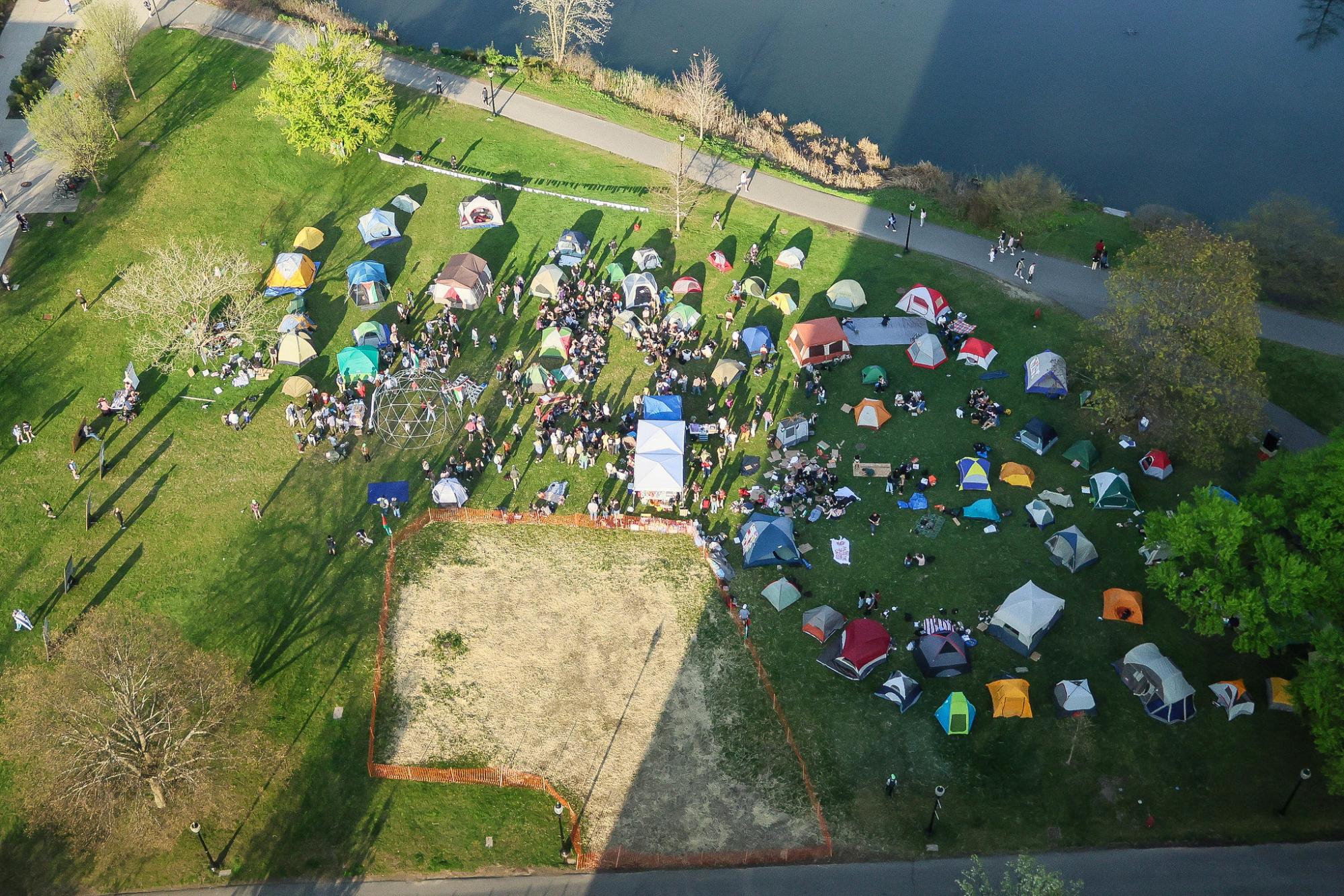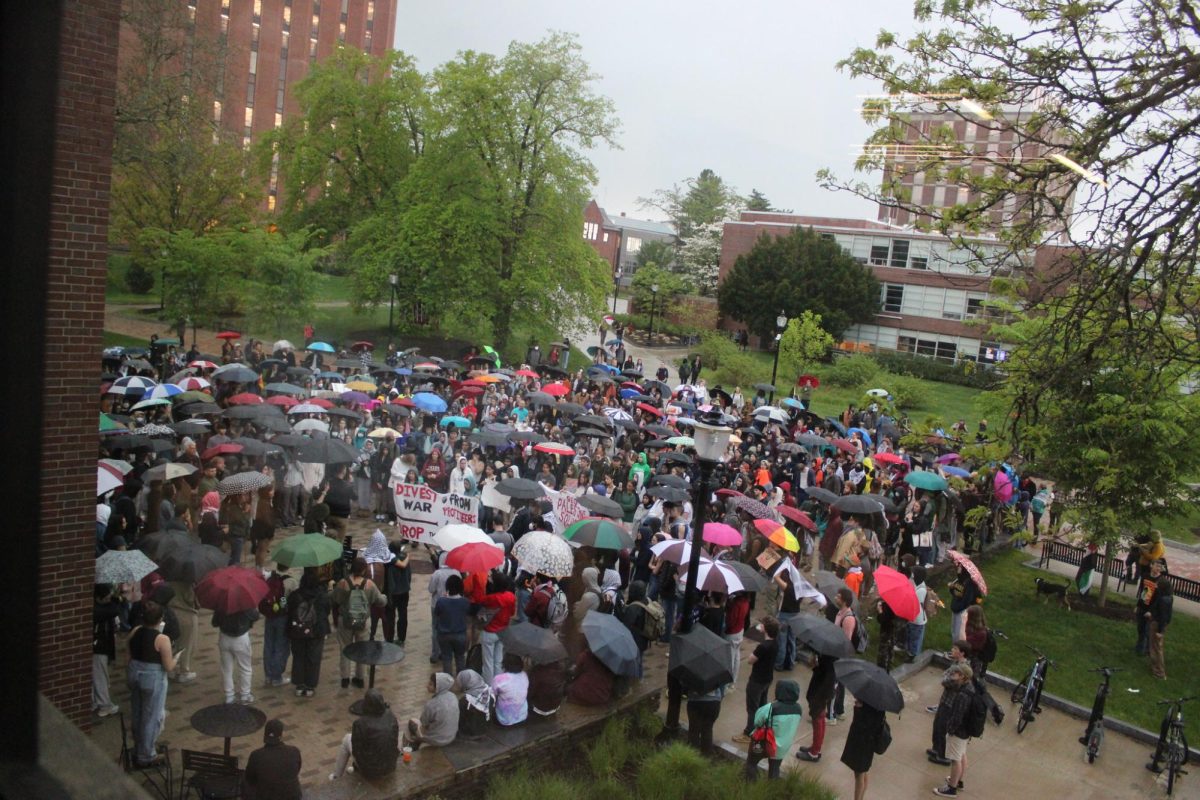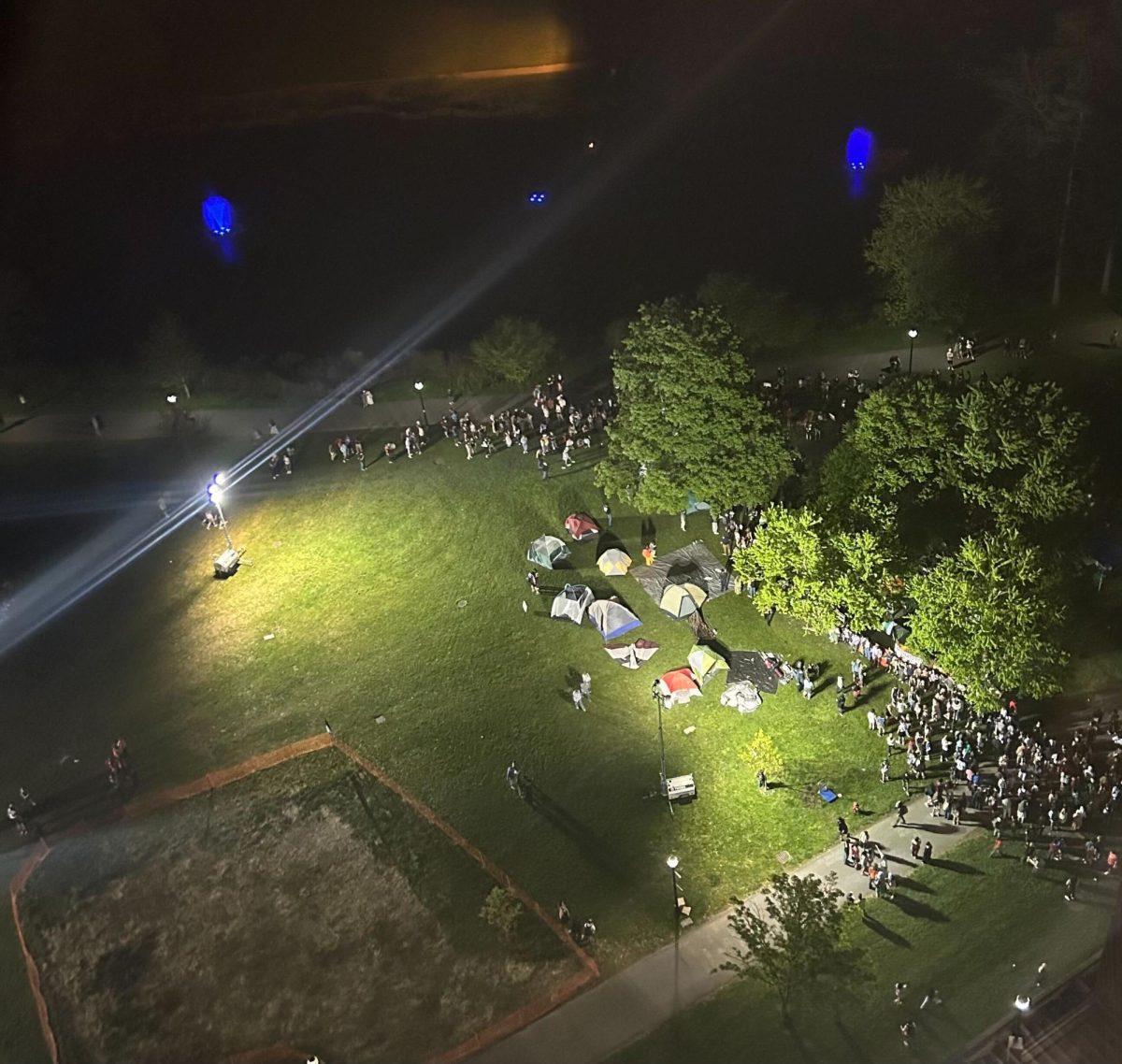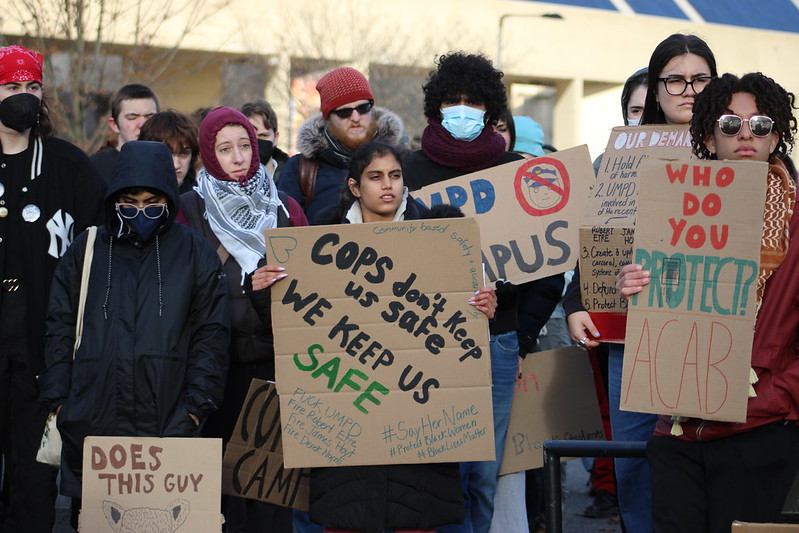Following a nationwide wave of demonstrations on college campuses, student protesters at the University of Massachusetts organized a Gaza solidarity encampment on the Student Union South lawn near the campus pond on the morning of Monday, April 29.
The formation of the encampment coincided with Founder’s Day, a celebration of the University’s creation. An email from the Office of Community Relations and University Events invited students to celebrate UMass Chancellor Reyes’ inauguration, attend an annual cookout at Haigis Mall and see other attractions.
Over the next two days, hundreds of protesters would remain on the lawn chanting, listening to teach-ins and making signs to call for UMass’s divestment from war profiteering companies and bring awareness to the ongoing bombardment in Gaza by Israel. The tents remained erect until Tuesday morning when administration and law enforcement presence prompted them to deconstruct their tent. But protestors remained until Tuesday night.
A congregation of sleeping tents, a food and water station, a first aid tent and information table was built and organized by Students for Justice in Palestine, UMass Dissenters and other advocacy groups. A large, metal geodesic dome was also constructed at the front of the encampment for professors to hold classes if they chose to do so.
Donations of supplies to the encampment came from members of Faculty for Justice in Palestine and other supportive community members. A steady 200 protesters remained at the site throughout the day, with interested passersby filtering in and out.
The UMass encampment site, and many others around the nation, was named a “Popular University for Gaza” which according to Maysoun Batley, an SJP organizer, supports the idea that “universities do not represent what the people want, and what the people want to learn and what the people want to value.”
“So we’re creating our own university on university grounds where our voices are heard and people feel listened to and people feel like their values are aligned with,” Batley, a senior sociology and Middle Eastern studies major, said.
Emmanuelle Sussman, vice president of UMass SJP and a senior political science and Middle Eastern studies major, said there was intention behind the encampment’s timing: “The school can’t go on business as usual having these grandiose celebrations,” she said. Sussman voiced frustration at the lack of a response from the University to instances of harassment and doxxing on campus.
In addition to UMass SJP and UMass Dissenters, members of the Young Communist League, Young Democratic Socialists of America and the Graduate Employee Organization’s Palestine Solidarity Caucus helped to organize. “A lot of work went into this, many different orgs went into this,” said Sussman.

Day 1
At about 9 a.m., around 100 organizers and attendees could be seen pitching tents, painting solidarity signs, listening to music and chatting amongst themselves.
One demonstrator handed out flyers for the Popular University for Gaza. The movement’s list of demands on the flyer included ‘DIVEST FROM ISRAEL’S GENOCIDE,’ ‘AFFORDABLE HOUSING FOR ALL,’ ‘COPS OFF CAMPUS AND AN END TO STUDENT SUPPRESSION’ and ‘DEMOCRATIZE UMASS.’

At noon, three members of the UMass Amherst Demonstration Response and Safety Team (DRST) entered the encampment with a bullhorn and informed protesters that the presence of tents were violating the University’s Land Use Policy as a Founder’s Day event was scheduled in that space.
The trio then passed out a sheet containing QR codes sending people to demonstration guidelines outlined by the University.
“We are directing you to take down your tents,” Jeff Hescock, the executive director of Environmental Health and Safety and Emergency Management, said. “Failure to comply with this policy is a violation of the student code of conduct.”
As Hescock concluded his announcement, an organizer told protesters gathered around that during last years’ protest of the housing crisis, when students set up sleeping tents on the same lawn, “They did not do this. They did not tell us we were in violation of the land use policy.” The trio continued handing out pamphlets to chants of “shame” and “what’s the difference?”
According to University Spokesperson Ed Blaguszewski, DRST was formed in early 2024. The team “communicates with event leaders when actions, by an individual or groups, are disruptive to university operations and/or could constitute a violation of university policies. The DRST also provides updates to university leadership, as needed,” according to Blaguszewski.
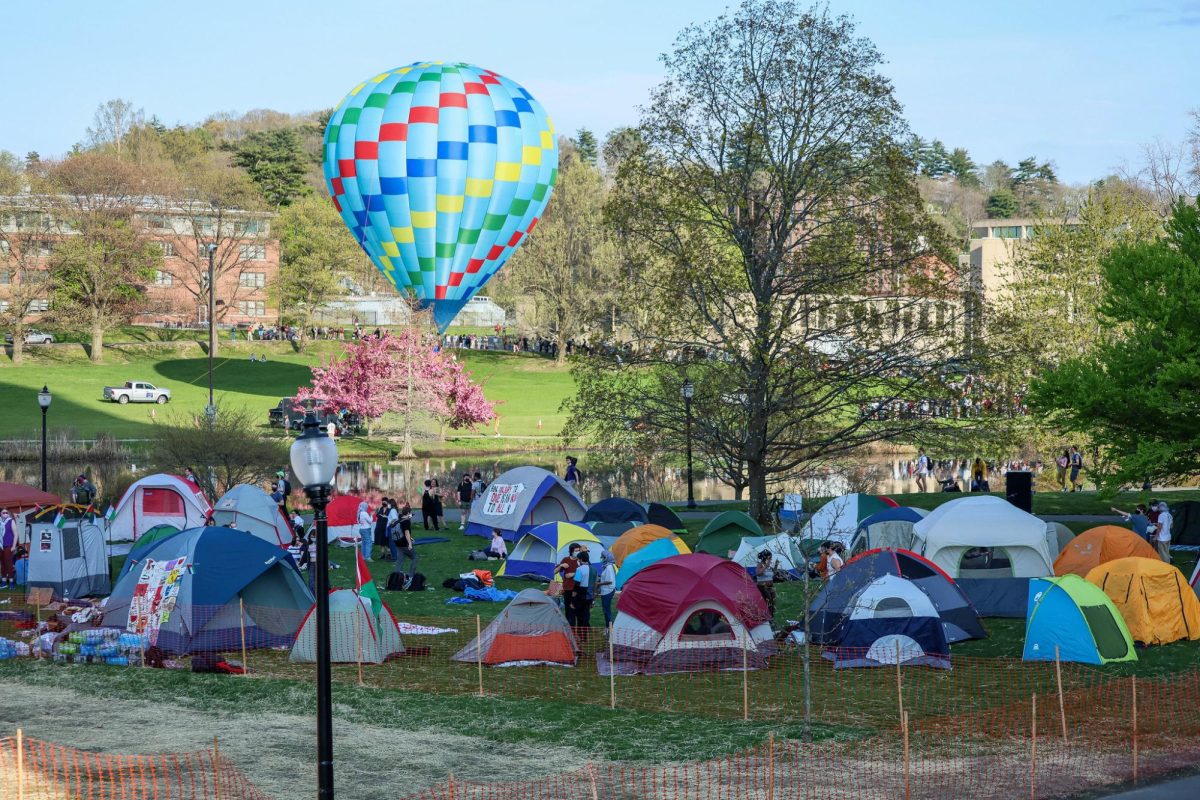
As the bustle of Founder’s Day spread across campus, over 100 people gathered for an “emergency meeting” with encampment organizers. An announcement was made around 12:45 p.m. updating participants on violation of student conduct concerns. From this point on some protesters addressed themselves using “camp names.”
A Jewish student by the camp name of Joseph explained that he was participating in the demonstration because of his belief that “student activism is, like, integral in positive social change.”
“I need to stand strong and denounce genocide in the face of a very cruel government that is, you know, attacking a less equipped [group of people].”
In the afternoon, a handful of Jewish students observed the encampment from the railing outside of the library.
One student said, “People have the right to protest, but when you’re interfering with other students’ education and getting to class, and allowing them to feel comfortable getting there, that’s when the University should step in. Because academics should come first as a school.”
When asked if they personally felt uncomfortable getting to class, multiple students answered “yes.”
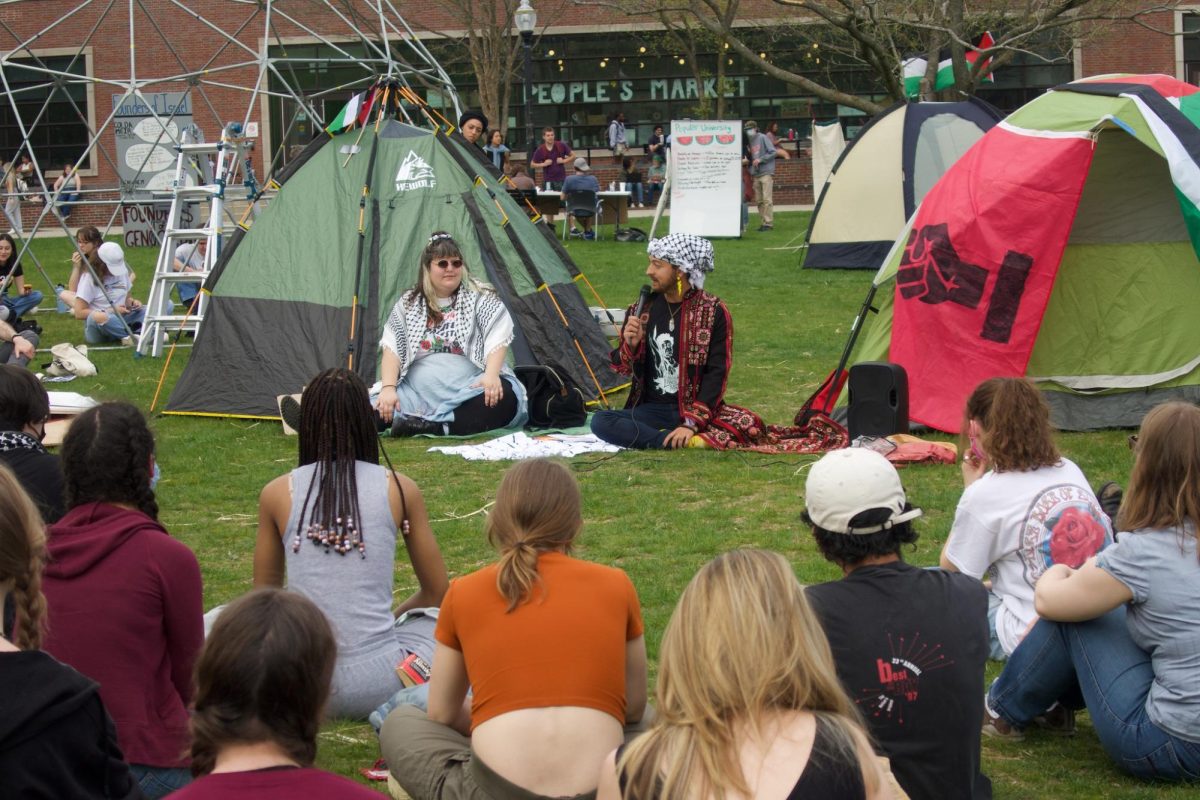
Close to 3 p.m., Mx. Yaffa, a trans and queer Palestinian activist, author and executive director of the Muslim Alliance for Sexual and Gender Diversity spoke to the crowd.
Yaffa’s family is Palestinian, Sudanese and Armenian, and they have lost over 200 family members. “I’m not entirely sure if I still have family left in Gaza,” Yaffa said.
“I don’t know if y’all know just how big of a moment this is or how big you all setting up this encampment is,” said Yaffa.
They sported a thobe, the long-sleeved ankle-length robe worn throughout the Arabian peninsula, embroidered with vibrant patterns. Palestinian embroidery features symbols like flowers, stars, olive branches and waves, Yaffa explained. The fishnets on their keffiyeh represent Palestinians’ connection to the Mediterranean, where their father’s family is from. Their mother’s family is from Jenin.
“So every town in Palestine has their own style of embroidery,” explained Yaffa. “It just represents our stories, our lineages. It just represents who we are, in all the different ways that we are, the things that we stand for, our connection to land, our connection to nature, our connection to one another, to the rest of the world.”
The same three representatives of DRST re-entered the encampment once more at around 4 p.m. to announce the protestors’ violation of University policy.
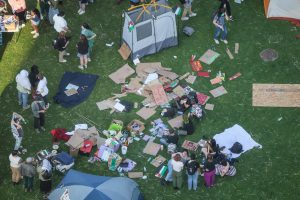
At 5 p.m. Reyes sent an email to the UMass community, stating that unauthorized structures, disruptive behavior and activities violating University policy or the rights of those on campus are not protected speech. The email noted that those in the encampment had been notified multiple times to leave.
His email indicated that “prior approval for the utilization of university property” is needed and that the Land Use Policy is meant to ensure “that spaces on campus are made available equally and fairly.”
A protester read the email to the crowd, who erupted in cheers after hearing they caused the cancellation of a Founders Day event, meant to take place on the lawn.
At around 5:30 p.m., a few students donning Israeli flags walked onto the encampment. An organizer with a microphone quickly shouted, “Zionists have entered our space.” The organizer led the crowd in call and response chants of “There is only one solution /Intifada revolution,” “From the river to the sea / Palestine will be free” and “Free Free Palestine.”
An Orthodox Jewish student who wished to remain anonymous had observed the encampment earlier and said her reason for bringing an Israeli flag to the event was “very simple and very peaceful. I just want them to know that Jews do in fact exist on this campus… I am just simply letting them know that we are here, and we do exist, and we are affected by this.”
Olive Yale, a junior linguistics major and counter-protester who entered the encampment, found the rhetoric used in chants to be inflammatory, specifically the use of the term “Intifada.” The term and its historical context has been a point of contention amidst the ongoing international conflict.
“These protesters, they don’t understand … that they’re really intimidating us,” Olive said. “I have heard from so many of my friends, that they are scared to show their Jewish identity… They are scared, especially to show any sign of pride in their homeland, or the Jewish nation.”
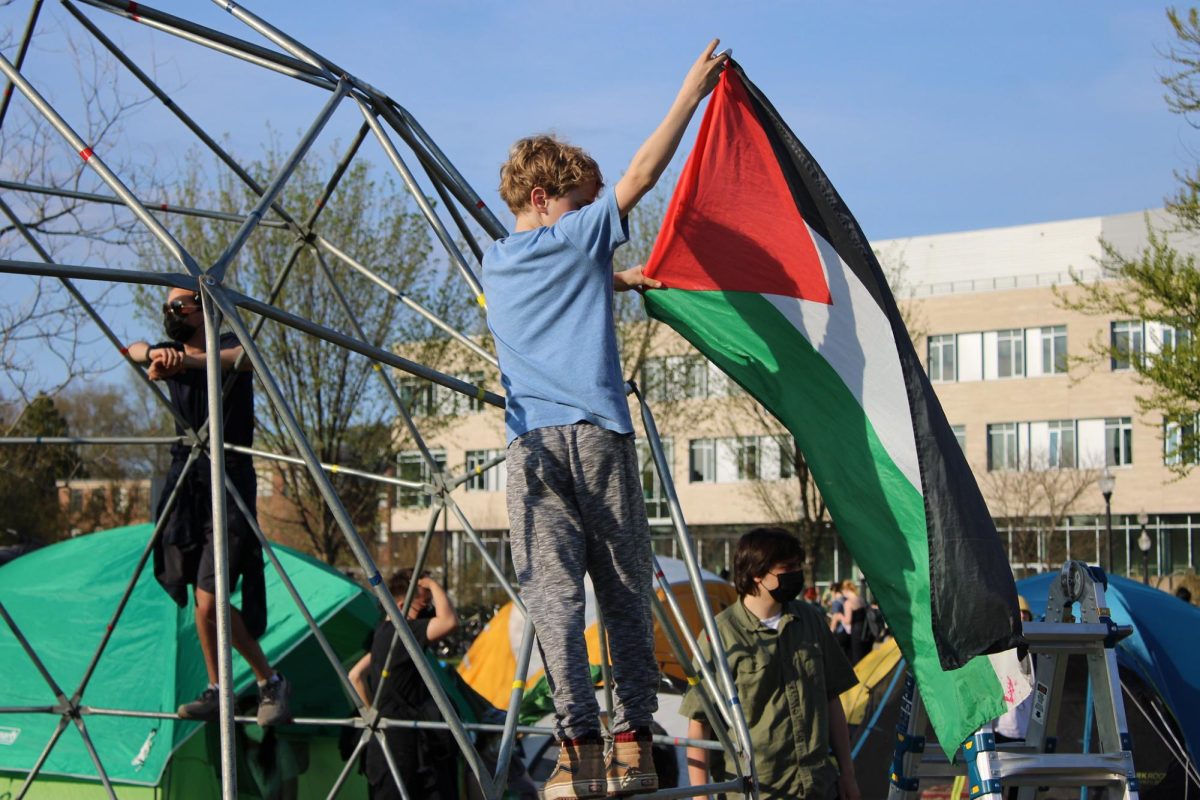
Members of the Valley Families for Palestine were present towards the afternoon and set up a table with bubbles and snacks while children played in the grass and climbed atop the geodesic dome at the front of the encampment.
Jill Brevik, an Amherst resident and co-founder of Valley Families for Palestine, was in attendance with her two children. Brevik said that the organization represents families across the Connecticut River Valley and provides opportunities to be engaged in advocacy work in spaces that are safe and allow kids to “learn about what’s going on in the world in an age-appropriate way.”
“I think that kids develop the bravery that it takes to be the students that are out here today demonstrating when they start early and learn that their voice matters and that they can stand up for what they believe in,” Brevik said.
64-year-old local Amherst resident Steve Westfield was also among the protesters. “The last I heard out of 63 family members – of my extended family in Gaza – 62 of them have been killed,” he said. “I don’t know about the last one [because] not much news gets out, you know? Or in.”
Westfield’s son is married to a woman from Palestine, and had many extended family members through her in the West Bank and Gaza. He came to the rally because of what’s happened to his family, and to express his dismay about the war in general.
“I want my message to be where I have Muslims in my family and Jewish people in my family… I want peace between all of those people,” he said.
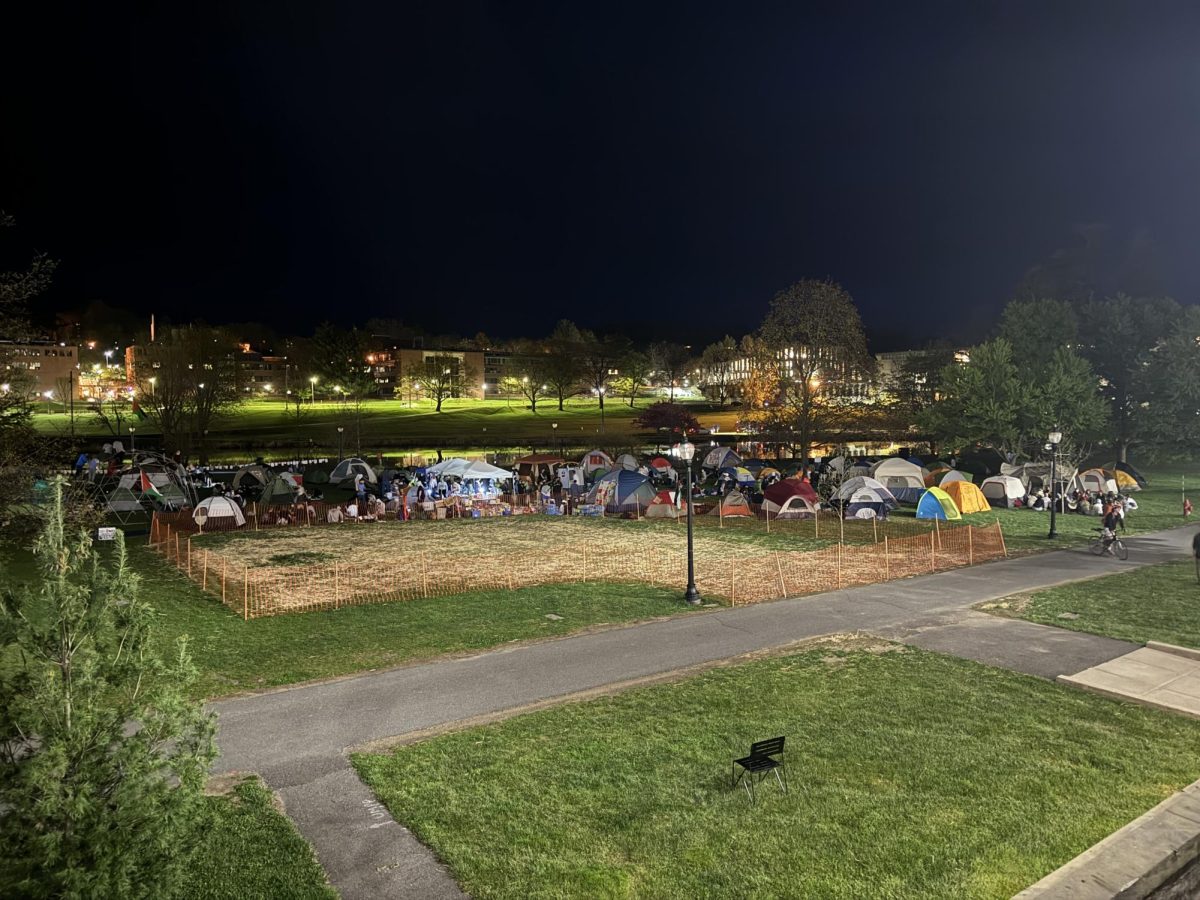
At midnight, the Instagram pages for UMass SJP and UMass dissenters issued a joint post reading:
‘WE JUST GOT WORD THERE IS GOING TO BE POLICE PRESENCE TOMORROW MORNING, SHOW UP AND BRING FRIENDS TO PROTECT THE ENCAMPMENT.”
Scouts, who walked in pairs in the surrounding area, were on the lookout for police and agitators to keep those under the medical and food tents fully informed. “People are vulnerable here while they are in a public space and sleeping,” Nate, a senior, said. “We want to make sure that we are, as a community, [looking out for each other].”
This unpredictability presented concerns for a junior student of color who was one of the arrested students at the Whitmore sit-in protest. Being on probation, the student did not want to risk further issues and would distance themselves if necessary. “At this point, it’s more important to have people out here building momentum and being visible,” the student said.

Day 2
Those at the encampment reported that police had arrived at around 6 a.m. on Tuesday morning, earlier than the 8 a.m. arrival they had previously been informed of.
Organizers asked protesters to prioritize collapsing all tents to demonstrate compliance with University police. By 7:50 a.m., only the three largest tents remained standing. Protesters began disassembling the geodesic dome and medical tents with food and water.
Emmanuelle Sussman reflected on the events of the previous evening, saying “I think a lot of people feel like this encampment is the safest they’ve felt on this campus for this entire year. However, that was severely tarnished by the presence of the administration throughout the day and the cops.”
She added that “there is absolutely no precedent” in reference to University enforcement of the Land Use Policy, saying it was a “double standard of retaliation” compared to past administrative response to an encampment staged by the UMass Radical Student Alliance last spring.
Sussman stated that the incident would be added to the federal complaint filed by advocacy group Palestine Legal on behalf of 18 UMass students, alleging University violation of Title VI of the Civil Rights Act. The complaint was filed on April 16.
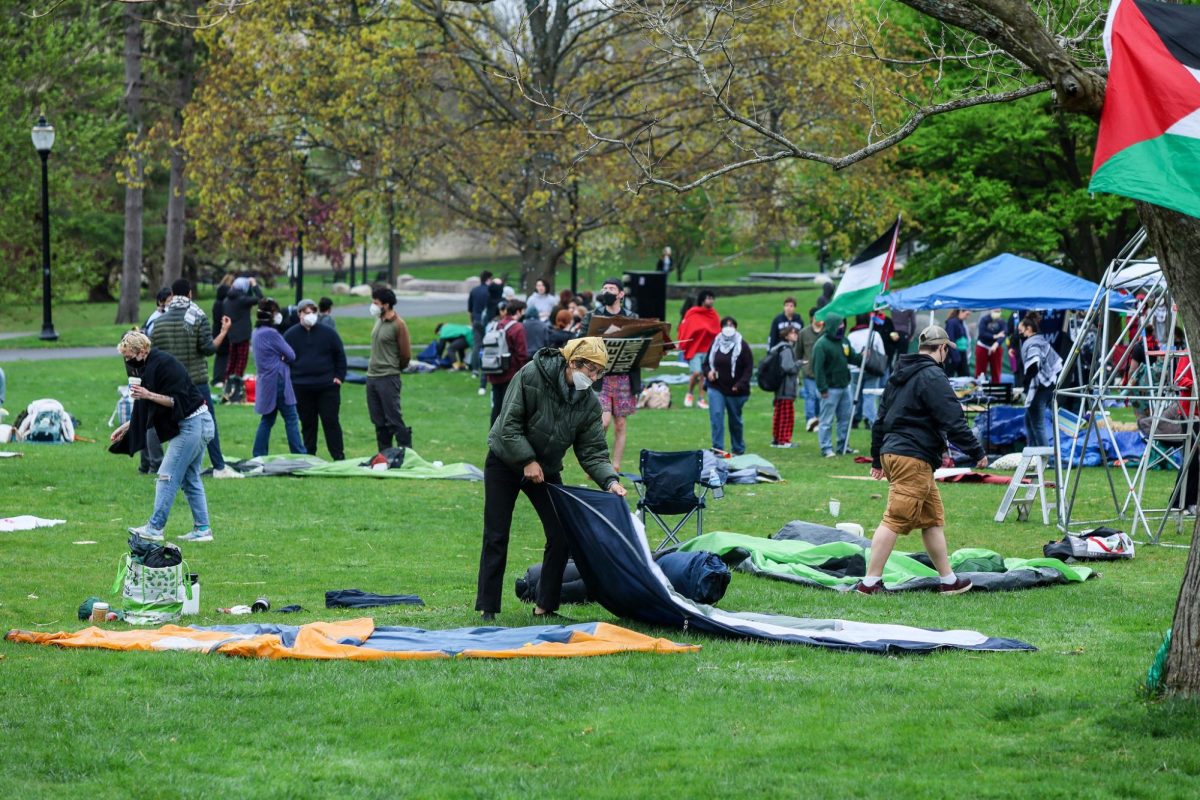
Northampton resident Jennifer Scarlott loaned a four-person tent to the protesters and scouted for police action during the previous evening. “These students have a deep moral sense of outrage that’s completely appropriately placed and expressed,” Scarlott said. “For the administration to allow certain kinds of public expression on campus but not others frankly to me, reeks of racism, and reeks of the monied interest at this institution.”
At 8:08 am, a police liaison was unable to officially state the direction that the movement was headed. The disbursement was creating a lot of “chaos with the media team between communicating with [administration] and the head organizers of the groups,” the liaison said.
At 8:11 a.m., members of the Emergency Operations Center team spoke with media personnel. The EOC team is “comprised of management personnel representing functional areas of the campus that are responsible for carry out response and recovery actions of the University,” according to their website.
“We have to ask them to be in steady progress this morning,” Kate Dorrity, the assistant director of emergency management said. “Students have been wonderful, [and now] they’re [just] waiting on a U-Haul.”
At around 8:15 am, an organizer led a crowd of between 70 to 80 people, chanting “We are complying but the cops are multiplying, free free Palestine.”
By 8:30 am, at least nine police officers stood around the edge of the encampment and on the terrace leading to Du Bois Library. Between Herter Hall and Haigis Mall, at least 18 police officers gathered near at least eight vehicles, including two vans for the Hampshire Sheriff. UMass Chief of Police Tyrone Parham could not be reached by the Collegian for comment.
At this time, all the tents were removed, including the food stock, medical supplies and welcome tent. The dome structure was actively being broken down as well.

While negotiations were taking place between organizers and administration on the side of the library, one of the administrators entered and walked through the encampment to approach other organizers. Protestors chanted for them to move off the space, saying “Tell me what a police state looks like, this is what a police state looks like.”
At 8:45 a.m., protesters gave a statement in response to the order to disperse all structures in violation of the Land Use Policy. This included a debate as to whether the tables holding medical and food supplies would be allowed. “We have complied with [administration] and taken all structures down that are feasible in the amount of time that they provided us.”
In this statement, the speaker stated that the goal of the movement, despite the disbursement, would be to continue mobilizing in a sustainable way by hosting the events planned for the rest of the day. The speaker made sure to emphasize that if the community on the lawn did not want to escalate the situation, structures needed to be removed.
“We will continue this rally and we will call upon all of you to help us to remove the structures so we all stay safe,” the speaker said. “This is not the end of our movement! The encampment is still here! The tents may be taken down, but the encampment still stands!”
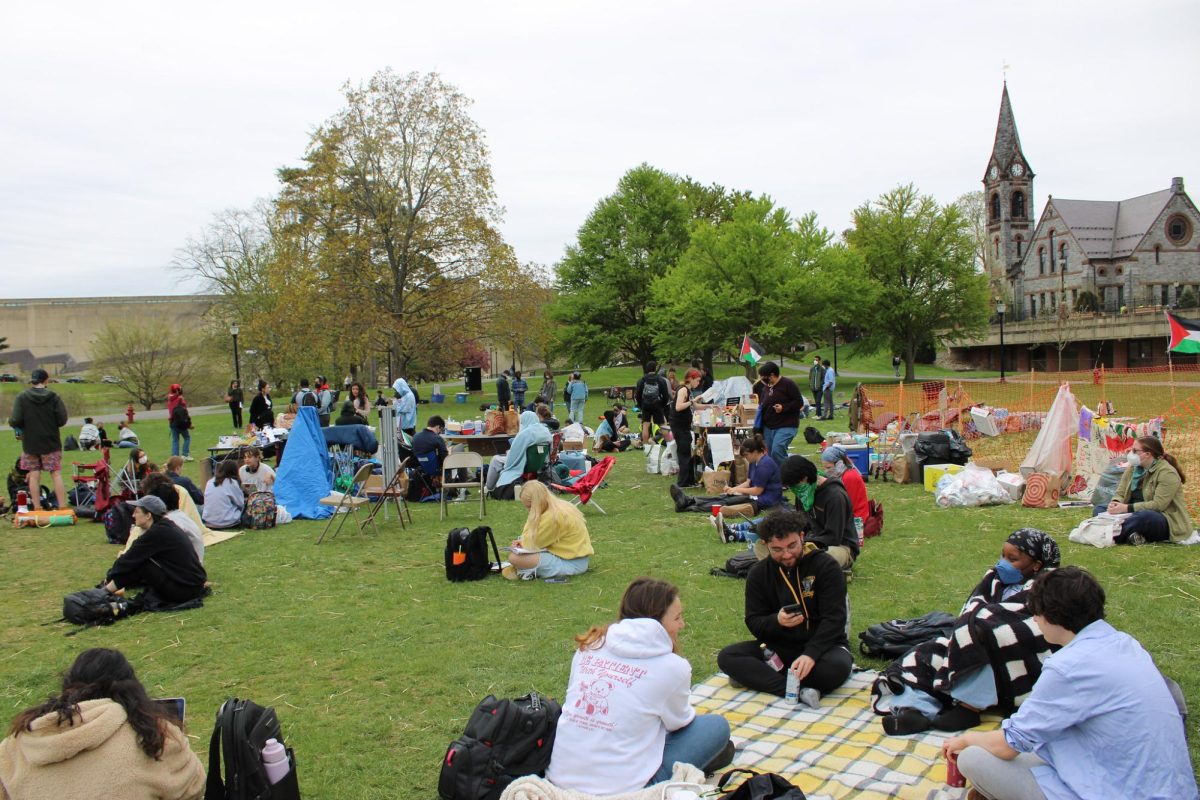
At around 8:15 am, while organizers continued to rally protesters, a group of faculty across various departments began forming around the south edge of the campus pond. Martin Hunter, senior lecturer in biomedical engineering, said the primary goal amongst faculty in attendance was to show solidarity for student organizers and protesters.
“I feel like the administration has not really shown a good faith effort to really have a conversation about these things,” Hunter said. “They say ‘Yes… be revolutionary, we’re all in favor of a social conscience in our students.’ But when the students have a social and an ethical conscience, they shut it down.”
Hunter also emphasized a larger focus amongst faculty to create an atmosphere to meaningfully address the conflict, not only between students and administration.
“I think as an academic community, I want us to be able to pick up on that,” Hunter said. “Continue that work, have those conversations. How can we… contribute to that? We evolve.”
Hoang Phan, a professor in the English department at UMass and Faculty for Justice in Palestine organizer said, “The rally is very positive, the students are very peaceful, and they’re very well organized, communicating the message about the genocide in Gaza and the U.S.-funded war, the Israeli military’s onslaught against the Palestinian people.”
The UMass FJP chapter formed last fall, shortly after the Whitmore sit-in, and dozens of faculty have been meeting since, Phan said. Until this year, Professor Phan was director of the Social Thought and Political Economy program at UMass Amherst. Many of his students are involved in SJP and Dissenters, he said.
Numerous faculty discussed how to best disseminate information to all the protesters regarding police enforcement and their entitled rights. They also organized teach-ins and asked other faculty members to host their classes out on the lawn.
Members of the group moved items from the tents and tables to U-Haul tracks near the campus center parking garage circle. The geometric dome was completely taken down by 9:45 a.m.
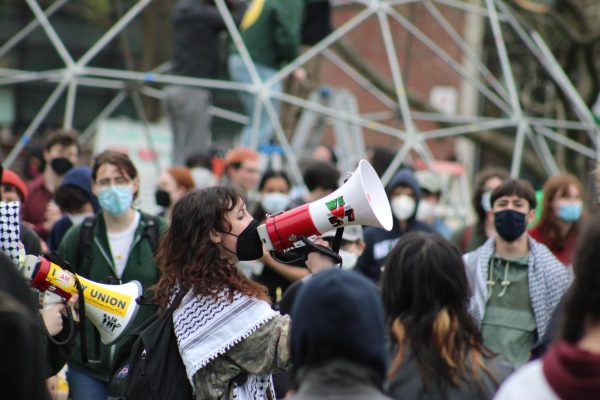
The events for the rest of the day were announced and speakers called on the group to continue organizing. As chants were shouted, members danced and clapped to boost morale.
At 10:15 a.m., an email from Chancellor Reyes announced the dismantling of tents by protesters.
“I am pleased to share with you that after the intervention of our campus demonstration response team, protesters who had established an unauthorized tent encampment beside the campus pond have peacefully dismantled it,” the statement read. “This is the sort of outcome we strive for as we navigate these challenging times.”
An individual who asked to go by the camp name “Sophia” said that the initial reaction to the email, and one that they will maintain, is that the email was “an attempt to make it seem like the administration is in communication and coordination with the student movement, which they are not.”
“The language in that email is condescending, demeaning and makes it seem as if the University is attempting to maintain our right to protest, which they are not,” Sophia said.
At 11:35 a.m., organizers welcomed 10 Amherst high school students. One student said of the encampment, “I think it’s a really powerful thing. I was pretty inspired because, well one, there are so many people here, two, being in tents overnight is like, that’s insane. That’s incredible. It just shows the commitment to the fight against the war going on.”
For this teenager, the broader conflict has personal importance. “My grandpa is Lebanese and he’s told me so many amazing stories from being in Lebanon… It’s a shame that it’s being attacked as well as everywhere else surrounding Gaza.”
Without the tents, the protesters still held South Lawn as community members sat in groups and listened in on lectures and teach-ins.
Organizers said that the group had no intention of staying overnight and packed up the remaining tables, food, drinks and other supplies by 8 p.m. A “People’s Assembly” will be held on Wednesday at the Student Union Lawn to gain community perspective on how to proceed with demonstrations.
The Collegian Staff can be reached at [email protected]

